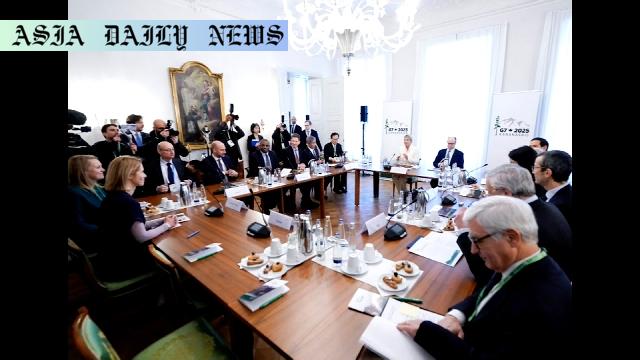Ukraine: G7 foreign ministers pledged to work together to ensure a durable peace, a prosperous Ukraine, and prevent the war’s recurrence.
The G7 foreign ministers pledged to ensure durable peace in Ukraine.
Plans include robust security guarantees and rebuilding efforts.
Sanctions on Russia tied to good-faith negotiations.
Condemnation of China’s, Iran’s, and North Korea’s military aid to Russia.

Introduction: The G7’s Pledge for Peace
The foreign ministers of the Group of Seven (G7) nations recently convened in Munich to address some of the world’s most pressing geopolitical issues, with a central focus on Ukraine. With the backdrop of Russia’s ongoing aggression, the G7 reaffirmed its unwavering commitment to support Ukraine in its fight for sovereignty and territorial integrity. The joint statement underscored a commitment to achieving lasting peace, ensuring Ukraine’s prosperity, and introducing robust security mechanisms to prevent future conflicts.
Commitment to Durable Peace and Prosperity
The G7’s declaration emphasized the importance of fostering a durable peace in Ukraine—one that not only ends the ongoing conflict but ensures its non-reoccurrence. This includes engaging in coordinated international efforts to develop security guarantees that will provide Ukraine with stability and long-term independence. The ministers also pledged to continue supporting Ukraine’s recovery, reconstruction, and economic growth as part of a broader strategy to ensure the nation thrives as an independent democracy.
Sanctions and Accountability
Another key point in the joint statement was the connection between sanctions on Russia and meaningful negotiations. The G7 members emphasized that additional sanctions would be contingent upon Russia demonstrating real, good-faith efforts toward ending the war. The group made it clear that actions such as withdrawal of Russian forces and establishing mechanisms for Ukraine’s security are prerequisites for the easing of international pressures on Moscow.
Global Condemnations: China, North Korea, and Iran
During the discussions, the G7 members criticized the military assistance provided to Russia by nations like North Korea and Iran. China’s dual-use technologies, which allegedly support Russia’s war efforts, were also subject to condemnation. By highlighting these alliances, the G7 sought to increase international scrutiny on entities exacerbating the conflict in Ukraine, thereby isolating Russia further on the global stage.
Japan’s Emphasis on Long-Term Assistance
Japanese Foreign Minister Iwaya Takeshi played a significant role in emphasizing the need for sustained support for Ukraine’s recovery. Japan’s leadership highlighted the necessity of mid-to-long-term investment in reconstruction efforts, ensuring that Ukraine is not only able to rebuild its infrastructure but also lay a solid foundation for future economic stability and growth.
Ukraine’s Participation in the Dialogue
Notably, Ukrainian Foreign Minister Andrii Sybiha was actively involved in the discussions. His participation underscored Ukraine’s central role in shaping the next steps of international diplomacy while gaining firsthand support from global leaders. Sybiha’s input provided a crucial perspective, ensuring the decisions made were aligned with Ukraine’s on-ground realities and long-term objectives.
Looking Ahead: G7’s Vision for Ukraine
As the meeting in Munich concluded, the G7 members reiterated their denunciation of Russia’s aggression while presenting a clear roadmap for peace and recovery in Ukraine. Their unified resolve sends a strong signal to the international community about their dedication to upholding international law and supporting nations under threat. The focus on sanctions, rebuilding efforts, and security guarantees reflects a holistic approach to resolving the crisis.
Through actionable commitments, the G7 has demonstrated a pathway toward not only ending the war but ensuring Ukraine emerges stronger, democratic, and sovereign. While challenges remain, the coordinated efforts between these global powers bring hope for a brighter, peaceful future for Ukraine and its people.
Commentary
The G7’s Progressive Stance on Ukraine
The recent meeting of the G7 foreign ministers brought forth a renewed commitment to achieving peace in Ukraine, underscoring the influence of collective international action. It’s heartening to see global leaders prioritize Ukraine’s sovereignty and the well-being of its citizens, while clearly identifying mechanisms to mitigate future threats. The emphasis on building robust security guarantees demonstrates a forward-thinking approach, as peace is not just about ending a war but also about preventing its recurrence.
The Role of Sanctions and Their Conditionality
One of the standout strategies discussed was linking future sanctions on Russia to demonstrable efforts toward ending the conflict. This conditional approach to diplomacy serves as both a stick and a carrot—holding Russia accountable without fully closing the door to negotiations. It’s a nuanced stance that allows for an enduring resolution while maintaining pressure on Moscow to respect international norms.
The Need for Continued Global Coordination
This meeting also highlighted the importance of countries like Japan leading discussions on long-term support and recovery. Mid-to-long-term assistance is crucial for Ukraine to rebuild sustainably, ensuring its resilience against both internal and external adversities. Japan’s advocacy for these issues reflects the growing global consensus on Ukraine’s pivotal role in the international order.
The G7’s active engagement offers hope, but the road ahead remains challenging. What stands out is their united vision that prioritizes peace, stability, and justice—principles that Ukraine, and the world at large, desperately need.


